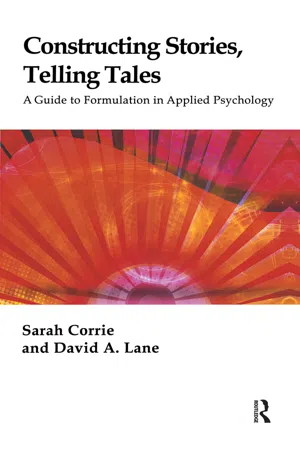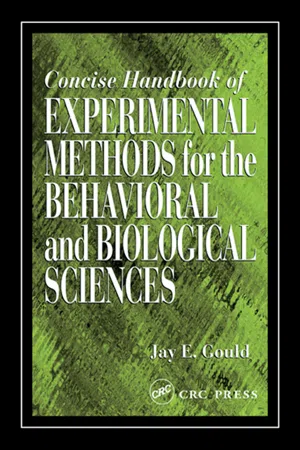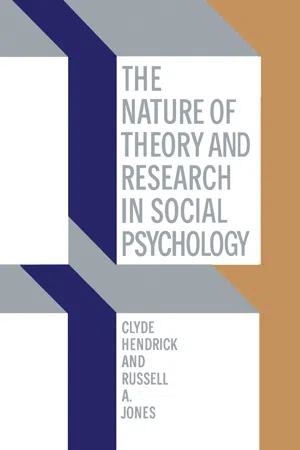Psychology
Formulation of Hypothesis
Formulation of hypothesis in psychology involves developing a clear and testable statement that predicts the relationship between variables. It is a crucial step in the scientific method, guiding research and experimentation. A well-formulated hypothesis helps researchers to systematically investigate and understand psychological phenomena.
Written by Perlego with AI-assistance
Related key terms
1 of 5
12 Key excerpts on "Formulation of Hypothesis"
- Kumar, K Nirmal Ravi(Authors)
- 2021(Publication Date)
- Daya Publishing House(Publisher)
7 Formulation of Testable Hypothesis After thorough review of collected literature for the selected research problem, the next step in the research process is to formulate a testable hypothesis (plural is hypotheses) relevant to the framed objectives and identified variables for the study. This formulation of testable hypothesis is usually considered as the principal instrument in research and it goes hand in hand with the formulated research problem. The Formulation of Hypothesis helps to explain the facts and to guide in the investigations of others and hence, hypothesis is frequently called as a Working hypothesis. That is, a working hypothesis is a provisionally accepted hypothesis proposed for further research. The word hypothesis is derived from the Greek word ‘hypotithenai’ meaning ‘to put under’ or ‘to suppose’. Etymologically, ‘hypothesis’ is made up of two words, ‘hypo’ (less than) and ‘thesis’ , which mean less than or less certain than a thesis. The following are the important definitions of hypothesis: ‘A hypothesis is a tentative generalization, the validity of which remains to be tested’ . (Lundberg) ‘Hypothesis is a proposition, which can be put to test to determine its validity’ . (Goode and Hatt) ‘Hypotheses are single tentative guesses, good hunches assumed for use This ebook is exclusively for this university only. Cannot be resold/distributed. in devising theory or planning experiments intended to be given a direct experimental test when possible’ . (Eric Rogers) ‘A hypothesis is a conjectural statement of the relation between two or more variables’ .- eBook - ePub
Constructing Stories, Telling Tales
A Guide to Formulation in Applied Psychology
- Sarah Corrie, David A. Lane(Authors)
- 2018(Publication Date)
- Routledge(Publisher)
- “[Formulation is] conducting hypothesis-driven interventions that are constantly monitored for effectiveness” (Bruch & Bond, 1998, p. xviii).
- “[A formulation is] a tool used by clinicians to relate theory to practice …” (Butler, 1998, p. 2).
- “Formulation is … a provisional explanation or hypothesis of how an individual comes to present with a certain disorder or circumstance at a particular point in time” (Weerasekera, 1996, p. 4).
- “Formulation is the summation and integration of the knowledge that is acquired by the assessment process (which may involve a number of different procedures). This will draw on psychological theory and data to provide a framework for describing a problem, how it developed and is being maintained” (Division of Clinical Psychology, 2001, p. 3).
- “[Formulation is] the elicitation of appropriate information and the application and integration of a body of theoretical psychological knowledge to a specific clinical problem in order to understand the origins, development and maintenance of that problem” (Tanier & Calam, 2002, pp. 311–312).
- “[Formulation] is a process whereby therapist and client work collaboratively to first describe and then explain the issues a client presents in therapy … Its primary function is to guide therapy in order to relieve client distress and build client resilience” (Kuyken, Padesky, & Dudley, 2008, p. 759).
- “Hypotheses are put forward to explain the situation and formulate a plan of action to try to overcome the difficulties presented” (Fell & Coombs, 1994, p. 113).
- “The clinical formulation is a series of working hypotheses based on assessment information and relevant psychological (and other) models. It is a means of trying to understand the person’s difficulties, in terms of the biological, psychological and social factors and events, which may have contributed to the current behaviours.” (Haarbosch & Newey, 2006, p. 143).
- eBook - PDF
Research Methods For Business
A Skill Building Approach
- Uma Sekaran, Roger Bougie(Authors)
- 2016(Publication Date)
- Wiley(Publisher)
The results of these tests offer us some clues as to what could be changed in the situation to solve the problem. Formulating such testable statements is called hypothesis development. Definition of a hypothesis A hypothesis can be defined as a tentative, yet testable, statement, which predicts what you expect to find in your empirical data. Hypotheses are derived from the theory on which your conceptual model is based and are often relational in nature. Along these lines, hypotheses can be defined as logically conjectured relationships between two or more variables expressed in the form of testable statements. By testing the hypotheses and confirming the conjectured relationships, it is expected that solutions can be found to correct the problem encountered. EXAMPLE Several testable statements or hypotheses can be drawn from the example depicted in Figure 5.4. One of them might be: Workforce diversity has a positive effect on organizational effectiveness. The above is a testable statement. By measuring the extent of workforce diversity and organizational effectiveness, we can statistically examine the relation- ship between these two variables to see if there is a sig- nificant (positive) correlation between the two. If we do find this to be the case, then the hypothesis is substantiated. If a significant correlation is not found, then the hypothesis has not been substantiated. By convention in the social sciences, to call a relationship “statistically significant,” we should be confident that 95 times out of 100 the observed relationship will hold true. There should be only a 5% chance that the rela- tionship will not be detected. 84 research methods for business Statement of hypotheses: formats If–then statements As already stated, a hypothesis can be defined as a testable statement of the relationship among variables. A hypothesis can also test whether there are differences between two groups (or among several groups) with respect to any variable or variables. - eBook - PDF
Research Methods For Business
A Skill Building Approach
- Roger Bougie, Uma Sekaran(Authors)
- 2021(Publication Date)
- Wiley(Publisher)
She also believes that the positive effect of the perceived information value on satisfaction with the company and purchase intentions is stronger when customers are highly involved. Develop a theoretical framework for this situation after stating what the problem definition of the researcher would be in this case. Once we have identified the important variables in a situation and established the relationships among them through logical reasoning in the theoretical framework, we are in a position to test whether the relationships that have been theorized do, in fact, hold true. By testing these rela- tionships scientifically through appropriate statistical analyses, or through negative case analysis in qualitative research (described later in the chapter), we are able to obtain reliable information on what kinds of relationships exist among the variables operating in the problem situation. The results of these tests offer us some clues as to what could be changed in the situation to solve the problem. Formulating such testable statements is called hypothesis development. DEFINITION OF A HYPOTHESIS A hypothesis can be defined as a tentative, yet testable, statement, which predicts what you expect to find in your empirical data. Hypotheses are derived from the theory on which your conceptual model is based and are often relational in nature. Along these lines, hypotheses can be defined as logically conjectured relationships between two or more variables expressed in the form of testable statements. By testing the hypotheses and confirming the conjectured relation- ships, it is expected that solutions can be found to correct the problem encountered. STATEMENT OF HYPOTHESES: FORMATS If–then Statements As already stated, a hypothesis can be defined as a testable statement of the relationship among variables. A hypothesis can also test whether there are differences between two groups (or among several groups) with respect to any variable or variables. - eBook - PDF
Research Methods For Business
A Skill Building Approach
- Uma Sekaran, Roger Bougie(Authors)
- 2020(Publication Date)
- Wiley(Publisher)
She also believes that the positive effect of the perceived information value on satisfaction with the company and purchase intentions is stronger when customers are highly involved. Develop a theoretical framework for this situation after stating what the problem definition of the researcher would be in this case. Once we have identified the important variables in a situation and established the relationships among them through logical reasoning in the theoretical framework, we are in a position to test whether the relationships that have been theorized do, in fact, hold true. By testing these rela-tionships scientifically through appropriate statistical analyses, or through negative case analysis in qualitative research (described later in the chapter), we are able to obtain reliable information on what kinds of relationships exist among the variables operating in the problem situation. The results of these tests offer us some clues as to what could be changed in the situation to solve the problem. Formulating such testable statements is called hypothesis development . DEFINITION OF A HYPOTHESIS A hypothesis can be defined as a tentative, yet testable, statement, which predicts what you expect to find in your empirical data. Hypotheses are derived from the theory on which your conceptual model is based and are often relational in nature. Along these lines, hypotheses can be defined as logically conjectured relationships between two or more variables expressed in the form of testable statements. By testing the hypotheses and confirming the conjectured relation-ships, it is expected that solutions can be found to correct the problem encountered. STATEMENT OF HYPOTHESES: FORMATS If–then Statements As already stated, a hypothesis can be defined as a testable statement of the relationship among variables. A hypothesis can also test whether there are differences between two groups (or among several groups) with respect to any variable or variables. - Jay E. Gould(Author)
- 2001(Publication Date)
- CRC Press(Publisher)
The following are some important general points : 1. There is a good deal of overlap and interrelatedness among the steps. 2. Scientists, therefore, often move back and forth between these steps. 3. The steps might be listed somewhat differently by different scientists. — Such variations, however, just represent complementary approaches to the gen-eral scientific method. • Example : Inductive method versus deductive method are two important com-plementary strategies used in science (covered later in this chapter under Hypothesis Formulation). 52 Concise Handbook of Experimental Methods Primary Steps There are seven major steps involved in the scientific method of research: 1) formulate a problem, 2) formulate a hypothesis, 3) design a study, 4) collect and organize the data, 5) summarize and statistically analyze the data, 6) evaluate the results and draw conclusions regarding the hypothesis, and then 7) communicate the findings. 1. Formulate a Problem — The starting point of any scientific inquiry is a research problem/question about the nature/description of, or the explanation for, some phenomenon. • Example: What is the cause of clinical depression? 2 . Formulate a Hypothesis — Next, a hypothesis is put forth as the possible answer/solution to the problem’s question. • Typically, this is a statement about the conjectured relationship among the factors that will be investigated (the independent and dependent vari-ables). ∞ Example: A deficiency in the serotonin neurotransmitter mechanisms of the brain is the cause of clinical depression. 3. Design a Study — The design is a plan for gathering data to test the hypothesis . • Scientists must determine whether the hypothesis is probably true or prob-ably false . ∞ In other words, does the hypothesis appear to solve the problem — does it answer the research question ? • Experimental designs are the most powerful designs for research (discussed earlier in Chapter 2).- Clyde Hendrick, Russell A. Jones(Authors)
- 2013(Publication Date)
- Academic Press(Publisher)
Parti BASIC ISSUES IN THEORY CONSTRUCTION AND RESEARCH METHODS This page intentionally left blank Chapter 1 FORMAL ASPECTS OF THEORY AND HYPOTHESIS TESTING Our discussion begins with a few remarks concerning the nature of science. Scientific objectives or goals have been variously described, but there are three themes that recur repeatedly: prediction, understanding, and control of phenomena. We will look at each of these important con-cepts in turn. In explaining them we will, in fact, examine the basic nature of theory and hypothesis testing. Prediction Intuitively, everyone has a notion of the meaning of prediction; psy-chologically, it is the anticipation of an event before it occurs. Being able to predict events in advance is, of course, quite useful in daily life, and is very important in science. However, the accurate prediction of events 3 4 1. Aspects of Theory and Hypothesis Testing is only a first step toward scientific understanding. People have made correct predictions about some phenomenon for, perhaps, centuries, and yet remained totally ignorant in terms of a scientific understanding of what was occurring. For example, the highly accurate prediction of sun-rise each day was not incongruent with the notion that the earth was flat. Astronomical predictions of the movement of stars could be made with considerable accuracy before the time of Newton. The poisonous and therapeutic effects of many drugs were known long before the chem-ical bases for their effects were understood. In our own interpersonal relations we make accurate predictions about other people continuously. We learn a whole set of assumptions about the nature of man and his behavior during our formative years. This naive psychology (Heider, 1958) enables us to survive in our interpersonal environment. If we consider a person to be cold and cruel rather than warm and kind we make considerably different predictions for his behavior in various situa-tions.- eBook - PDF
Social Beings
Core Motives in Social Psychology
- Susan T. Fiske(Author)
- 2018(Publication Date)
- Wiley(Publisher)
Fourth, we will see that some methodological challenges are peculiar to social settings and the core social motives that people bring to them. Finally, the chapter includes a brief discussion of research ethics. By the end of the chapter, I hope you will see how the research enterprise operates and what dilemmas it confronts, that is, how social psychologists conduct their science. 30 Forming Hypotheses: Conceptualization 31 Table 2.1 Happiness, after Spending on Self or Another Purchase goody bag for self or sick child Self Sick child Mood and life satisfaction −0.24 .26 Source: Data from Aknin et al., 2013. Forming Hypotheses: Conceptualization The first chapter noted that social psychology is scientific. As a science, it involves the dynamic interplay among theory, method, and application—all three of which influence each other. This first section will tackle conceptualization: how social psychologists develop hypotheses, based on both theory and application to social problems (see Fiske, 2004 for other sources of ideas). The second section addresses operationalization: how social psychologists test scientific hypotheses, whether theory-based or application-oriented. Application as a Source of Hypotheses Most textbooks and lectures assume theory as the basis of research, but most introductory students assume real-world issues as the basis of research ideas, so the chapter starts there for the moment. Many social psychologists in fact go into the field because of an interest in improving the world, and many government agencies that fund research also emphasize the importance of applications. Indeed, some of the most famous social-psychological research focuses on an important social issue, rather than a specific theory. For example, Craig Haney, Curtis Banks, and Phillip Zimbardo (1973) started from the premise that prisons fail on humanitarian, pragmatic, and economic grounds. - eBook - PDF
Methodology
Foundations of inference and research in the behavioral sciences
- Adriaan D. De Groot, Spiekerman J. A. A.(Authors)
- 2020(Publication Date)
- De Gruyter Mouton(Publisher)
If we try to be more specific, and in particular to answer the question what is predicted, we find that the scientific prediction differs from the ordinary notion of 'prediction' in these respects. 1) A scientific prediction — in the context of a testing procedure — is always derived from a hypothesis. It has nothing of the oracular; it is not thrown off at random; nor is it based on hunches or on implicit theories; invariably a scientific prediction is a deductively derived specification of an explicitly formulated hypothesis. The hypoth-esis, in turn, does not spring full-blown from an empty void. Logically, it derives as a rule from a theory of more general import; empirically, it builds on findings from earlier investigations. 2) That which is predicted is always the outcome of a precisely speci-3; 4; 1 89 3. F O R M U L A T I O N : A. T H E D E D U C T I V E P R O C E S S fiable testing procedure. The prediction states what will in a certain respect be found if 'specific, i.e., prestated critical procedures are carried out on antecedently specified empirical materials' (cp. 3; 2; 2). No general precepts can be given for the nature and the amount of the materials, the number of observations or cases required for one prediction, or the operations that the raw materials of observation must undergo before the actual outcome is obtained. Much will depend on the hypothesis, with regard to which the prediction is to provide 'relevant information.' The prediction may refer to just one observation in a single crucial experiment, but equally to some laboriously computed outcome of the processing of extensive data, comprising numerous observations or cases. 3) A scientific prediction may be made with respect to events in the past as well as in the present or in the future. In this connection psychol-ogists sometimes differentiate between 'prediction' and 'postdiction,' but this is not a fundamental distinction. - Keith Dowding(Author)
- 2015(Publication Date)
- Red Globe Press(Publisher)
102 Chapter 5 Hypotheses and Theory Testing 5.1 Introduction In Chapter 4 I distinguished many different ways in which the term ‘theory’ is used, dividing them into two main forms: ‘perspectival’ and ‘explanatory’. Explanatory theory, if it is at all useful, must produce predictions in the sense in which I defined them. My definition of a prediction is broad, but when we have formal models we have more precise predictions as deduced explicitly from a model. Non-formal models are suggestive of such hypotheses. In this chapter, when I use the term ‘theory’ I mean model: for strict hypoth-esis testing, a formal model; for ‘suggestive hypothesis testing’, non-formal models. Where it matters whether we have a formal model I will use the term ‘formal model’. Remember that models are supposed to demonstrate the working parts of mechanisms. Laws or ‘law-like generalizations’ are the invariant aspects of mechanisms (subject to quantum effects at the highest granularity – see discussion in Chapter 6). Mechanisms tend to produce certain types of out-comes, so the outcomes of mechanisms (the predictions of the model that specify them) are empirical generalizations. Empirical generalizations are not invariant (or as invariant) to the extent that (1) the conditions of the model do not fully obtain (the mechanism is subject to other forces not contained in the model of it) or (2) many models produce multiple equilibriums so predic-tions themselves are probabilistic. In this chapter I will eschew many of the complications of interpreting testing hypotheses. We have enough work to do understanding what counts as a test under different versions of the proper scientific method. So this chapter is about empirically testing theories. Some think that sim-ply means seeing whether or not a purported generalization holds. Not all are clear about whether the generalizations of which they write are law-like or empirical.- eBook - PDF
The Practical Researcher
A Student Guide to Conducting Psychological Research
- Dana S. Dunn(Author)
- 2012(Publication Date)
- Wiley-Blackwell(Publisher)
A variety of exercises and suggestions accompany each of these topics, and such details add to the precision of your experiment and enhance its likelihood of success. DOING RESEARCH: IMPLEMENTATION STAGE Practical matter: How do I operationalize the variables in my study and link them to my hypothesis and theory? Solution: Practice writing operational definitions for them (see Exercise 6.A – p. 168) Practical matter: How will I know what to do when I conduct my experiment? Solution: Write an experimental script to guide you (see Exercise 6.B – p. 175) Practical matter: How do I keep track of the experimental condition that each participant experienced? Solution: Create a record of experimental conditions for each participant (see Exercise 6.C – p. 176) Practical matter: How can I be certain that an independent variable affected the participants’ behavior? Solution: Develop a manipulation check (see Exercise 6.D – p. 177) Practical matter: How can I keep track of participant reactions to the dependent measure? Solution: Create a dependent measure record (see Exercise 6.E – p. 185) Practical matter: How do I randomly assign participants to conditions? Solution: Learn to use a table of random numbers (see Exercise 6.F – p. 193) Formulating a Testable Hypothesis Any experiment in psychology must have a hypothesis, the guiding force behind the research. As was discussed previously, a hypothesis is a prediction, an educated guess, characterizing the relationship between two or more variables. In scientific investigations, 166 Chapter 6: Experimental Research there are two types of hypotheses: null hypotheses and experimental hypotheses. Both types of hypotheses are considered by an investigator when conducting experi- mental research in psychology. The null hypothesis is the “hypothesis of no difference.” It assumes that the two groups being examined are the same (i.e., A = B) with respect to some behavior. - eBook - PDF
Principles of Research in Behavioral Science
Fourth Edition
- Bernard E. Whitley, Jr., Mary E. Kite(Authors)
- 2018(Publication Date)
- Routledge(Publisher)
The proposal serves two functions. First, the process of writing down the background for and design of your study helps you identify any missing elements. In presenting the reasoning behind your hypotheses, for example, you might find a gap in the logic underlying your derivation of the hypotheses from your theory. Second, you can have other people read the proposal so that they can find any problems in background or design you might have overlooked. A fresh eye, unbiased by the researcher’s intense study of a topic, can bring a new, useful perspective to the research question, hypotheses, and design. How detailed you make the proposal depends on its purpose. A thesis or dissertation proposal (called a prospectus) will be highly detailed; a grant proposal or one that you prepare for your own use may contain less detail. In either case, any problems found in the research proposal must be dealt with by backing up in the process shown in Figure 5.1 until a resolution can be found. Formulating a Research Question 197 Once you have validated your research proposal by ensuring that it is as problem-free as possible, you can begin your project. For now, let’s move on to some other issues sur- rounding research questions: replication research, designing research for utilization, and sources of bias in the hypothesis formulation process. A Pause to Reflect Here are some questions to help you review and think about the material in this section: • What constitutes a good research hypothesis? Give examples of bad hypotheses and show how they can be improved. • Explain the difference between a research hypothesis and a statistical hypothe- sis.
Index pages curate the most relevant extracts from our library of academic textbooks. They’ve been created using an in-house natural language model (NLM), each adding context and meaning to key research topics.











